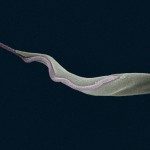Link to Pubmed [PMID] – 7558149
Immunology 1995 Aug;85(4):556-61
Resistance to Mycobacterium avium depends on both genetically encoded macrophage functions and acquired T-cell immunity. Cytokines may play a role in either type of resistance. We studied the expression of interleukin-2 (IL-2), IL-4 and interferon-gamma (IFN-gamma) in naturally susceptible BALB/c (Bcgs) and naturally resistant C.D2 (Bcgr) congenic mice infected with two strains of M. avium (one highly virulent and another of low virulence). We observed that cytokine expression patterns correlated better with the virulence of the micro-organism than with the genetic background of the host. The control of the infection by the low virulence strain in either mouse strain was associated with an increased expression of IFN-gamma and IL-2. Only Bcgs mice infected with a virulent strain of M. avium were unable to restrict bacterial growth. An increased expression of IL-4, early during infection, was detected in the course of the latter infection but played no role in determining the susceptibility to infection. Neutralization of IFN-gamma or IL-2 with specific monoclonal antibodies led to an exacerbation of the infection in Bcgr mice by the two strains of M. avium and in Bcgs mice infected with the low virulence strain of M. avium.

